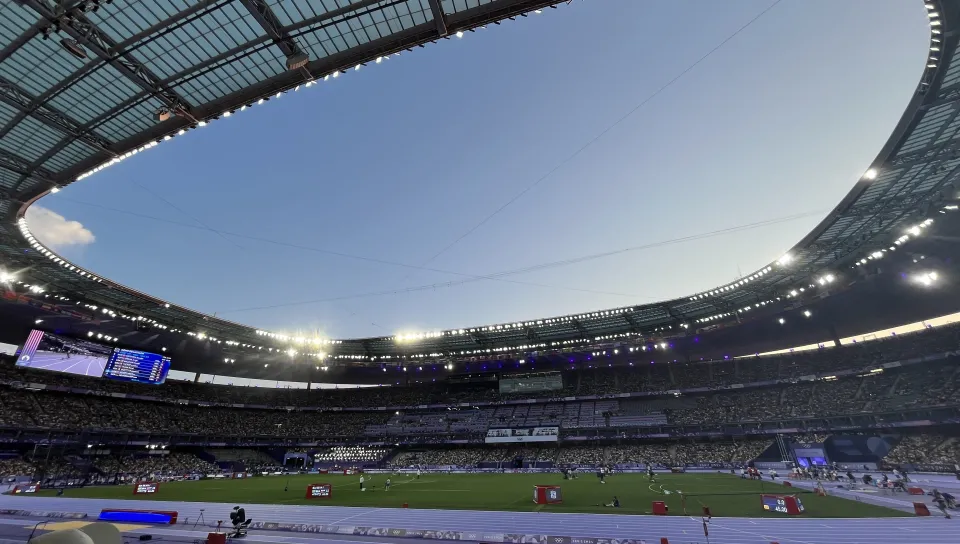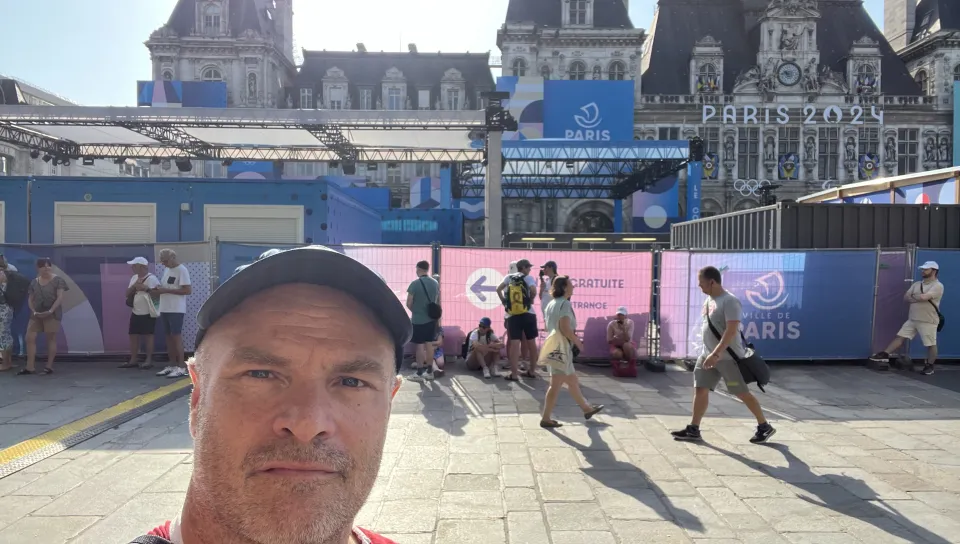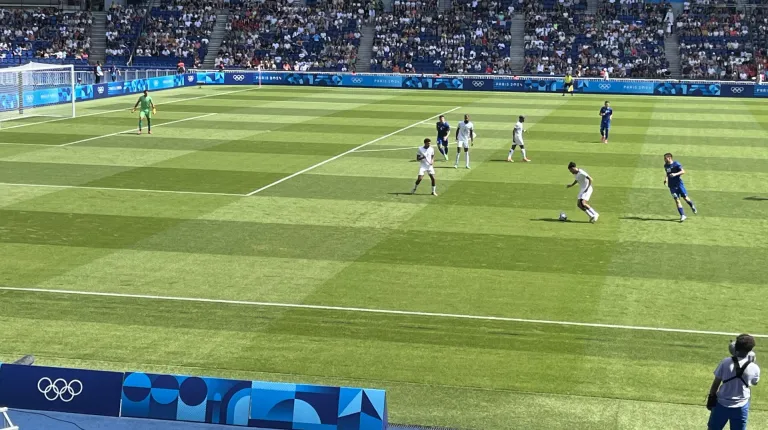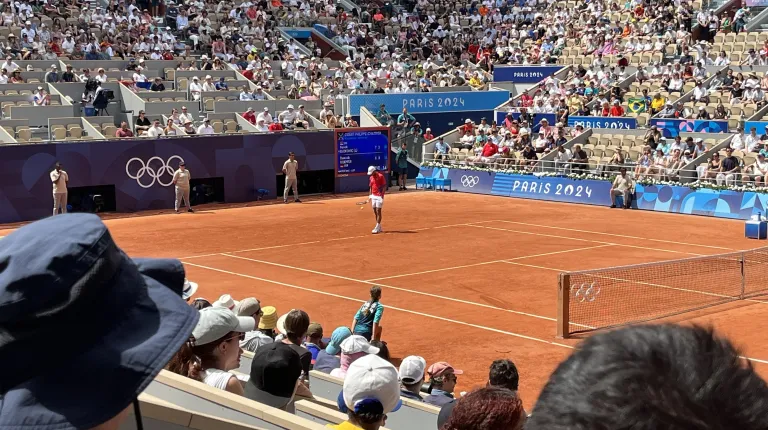
Inaugural College of Business Dean Gathers Data to Inform Future Case Studies
Mere hours after watching the historic 2024 Paris Olympics Opening Ceremony, Norm O’Reilly couldn’t stop talking about the sports marketing missteps, triumphs, and coups that he would soon observe in person at the 2024 Summer Games — and how well all of it would serve in case studies at the University of New England’s newly established College of Business.
O’Reilly, Ph.D., MBA, M.A., CPA, took over as the inaugural dean of UNE’s College of Business on July 1 after serving as dean of the Graduate School of Business at the University of Maine. The trip to the 2024 Paris Games was a previously planned family trip with his wife, Nadège Levallet, and four children. But as the author or coauthor of 20 books and more than 165 publications, O’Reilly never quits analyzing how athletes, teams, and sports brands tell their stories. So, he’ll still be taking notes on the marketing power of the Games and even producing a series of videos that will be highlighted on UNE’s Instagram — with an assist on photography and video footage from his daughter, Emma, and sons, Kian, Thomas, and Leland.


Track and field events take place inside the Stade de France, the 2024 Olympic Stadium, in Paris (left); O’Reilly and his family cheer on Olympians from the stands (right).
“They're built into the research,” O’Reilly quipped about his family.
“Few things on the planet compare with the kind of attention given to the Olympics, maybe a World Cup final — maybe. Starting with the Olympic Opening Ceremonies, somewhere between 1.5 to 2 billion people around the world will tune in to watch. I’ve done lots of research to show that this is one of the few battlegrounds that’s left in the digital age where you can have all of those eyeballs together at once.”
As both a tireless researcher and consummate sports fan, O’Reilly has fashioned himself into a bonafide student of the Games. He’s enjoyed a front-row seat to six Olympics and four Paralympics, including as the Deputy Chef de Mission for the Canadian Paralympic Team at the 2016 Rio Games. He’s done dozens of case studies on the Olympics and Paralympics and the sports sponsorship surrounding it.
While in Paris and at surrounding venues, O’Reilly hopes to find examples of what’s called “ambush marketing” — the clever strategies used by competitors of the Olympic sponsors to undermine the effectiveness of the Games’ official sponsors, such as Coke, Omega, Alibaba, and Visa, and leverage Paris’ presence on the world stage.





Clockwise, from left: The Eiffel Tower and 2024 Olympic logo viewed at night; O’Reilly poses in front of the Hôtel de Ville, Paris’ city hall; Olympians play tennis inside the Stade de France; O’Reilly takes in the Olympic triathlon, an event he knows well; and soccer is played on a field inside the Olympic Stadium.
“It’s a fascinating 16-day laboratory that you can observe firsthand,” O’Reilly said. “Pepsi knows during the Olympics they’re losing customers to Coke, so they'll try different things, and it’s legal. For example, in London in 2012, MasterCard sponsored a big London fair and had the logo on the passes for the Tube.”
The O’Reilly family won tickets in the Olympic lottery and plans to attend a range of events including a night of track and field, the women’s and men’s tennis quarterfinals, the men’s basketball quarterfinals, soccer, and O’Reilly’s personal favorite: the triathlon. A competitive triathlete, O’Reilly recently raced in the 2023 Ironman World Championships.
The 2024 Paris Games serve as the ideal study subject for the dean of a college that will soon launch UNE’s Research Center in Sports Business Innovation.
“The Olympic sponsors don’t give you specifics, but I’d say the (return on investment) at the Games is off the charts. These are nine-figure deals that turn into people buying their products at the end of the day. So, the sponsorship works. Anything we learn here, we will build on the streams of research,” said O’Reilly, who also is a partner of the Toronto-based marketing company The T1 Agency.
But the financial benefactors of the Games are not limited to the marquee sponsors. O’Reilly said research shows that 40 percent of people in developing countries make purchase decisions based on the brands that sponsor their national team, favorite team, or favorite athlete. And since sponsorship today is no longer confined to just televised commercials, but is also broadcast across a suite of integrated social media channels, the race to win consumers can get interesting.
Learn About Sports Marketing at the 2024 Olympics with UNE’s Norm O’Reilly
Before 2012, anyone associated with the Olympics— such as staff, coaches, volunteers, and, of course, athletes — were very limited in what they could share on social media about their experiences at the Games. But that all started to change at the London Games, thanks to the International Olympic Committee, who recently updated their social and digital media guidelines again for the 2024 Paris Games. For the most part, athletes can now share their experiences with their followers. O’Reilly believes it changed things for the better for sports — and athletes.
“Since then, it’s been a great opportunity for athletes. Not Serena Williams or Michael Phelps, because how much do they already make? But for that next-level athlete. That’s what I love about it: It’s super helpful for the athletes,” O’Reilly said.
Watch O’Reilly Discuss Olympic Sponsorships on NEWS CENTER Maine
In the past, the IOC has prevented athletes from interacting with brands that are not official sponsors of the Olympic games, but the rules have changed. UNE’s Norm O’Reilly explains why.